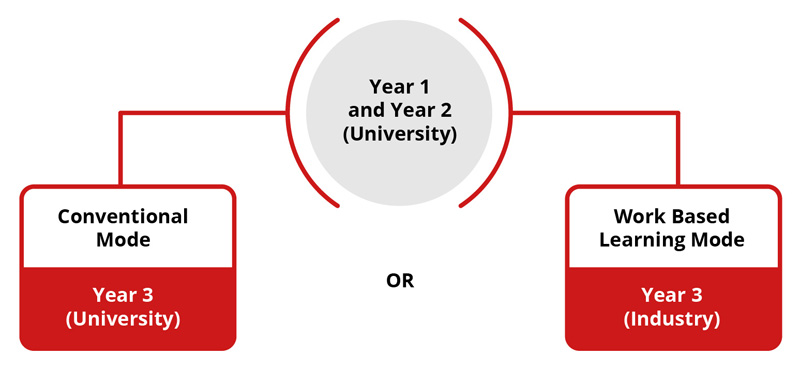
Overview
This programme offers a robust combination of mechanical engineering fundamentals and emerging digital technologies to ensure strong industry relevance and future readiness. Through a balanced curriculum comprising core engineering science, digital tools, and hands-on projects, students will develop the skills needed to design, develop, and enhance mechanical systems with integrated digital technologies.
As they progress, students will gain exposure to key areas such as automation, IoT applications, computer-aided engineering, machine learning, and industrial data analysis. Emphasis is placed on practical application through lab work, prototyping, final year projects, and the option of Work-Based Learning, allowing students to engage with real-world engineering practices.
By combining technical knowledge with digital tools and industry engagement, the programme prepares graduates to contribute effectively to the development and optimisation of modern mechanical systems across a wide range of industries.
Bachelor of Digital Mechanical Technology with Honours
Where Mechanics Meet the Digital Frontier
Step into the future of engineering with the Bachelor of Digital Mechanical Technology with Honours, a forward-looking programme designed to develop technologists who can integrate mechanical systems with cutting-edge digital solutions. Grounded in strong mechanical engineering fundamentals including design, statics, dynamics, materials, and manufacturing, this degree evolves to incorporate advanced technologies such as automation, robotics, artificial intelligence, industrial IoT, and data-driven engineering.
The programme places a strong emphasis on practical, project-based learning, supported by hands-on prototyping, simulation tools, and industry-standard software. Students gain real experience through courses in computer programming, system dynamics, machine vision, machine learning, and AR/VR data visualisation, bridging the gap between traditional mechanical systems and intelligent digital ecosystems.
The final year offers flexibility for students to either continue with a conventional on-campus mode or opt for the Work-Based Learning (2u1i) pathway, which blends academic learning with direct industry involvement.
Whether you're passionate about intelligent factory systems, industrial automation, or digitally enhanced mechanical design, this programme provides a dynamic platform to innovate, create, and shape the future of mechanical technology.
This programme is recognised by the Malaysian Board of Technologists (MBOT), providing graduates with professional recognition that enhances their credentials in the competitive field of digital mechanical technology.
What is 2U1I?
2U1I stands for 2 years in University and 1 Year in Industry, structured Work-Based Learning (WBL) model designed to intensify industry exposure and produce workforce-ready graduates. Students who choose this pathway will complete their final year in an approved industry setting, where they work on real-world projects under industrial supervision. Academic credits are earned through industry-delivered modules and performance assessments. The experience equips students with practical skills, deeper technical insights, and a competitive edge in the job market.

Eligibility for WBL:
- Completion of ALL Year 1 and 2 subjects, including MPU requirements.
- Fulfilment of any additional requirements specified by industry partners.
Academic Requirements
Local matriculation
Minimum CGPA 2.00
Foundation from other university/ college
Minimum CGPA 2.00
STPM
A pass in STPM with a minimum grade of C (CGPA 2.00) in Mathematics and one relevant Science subject
A level
Minimum 2Ds including Mathematics and one relevant science subject
Other qualifications deemed equivalent to STPM/A-Level by the Malaysian Qualifications Agency
Minimum overall average of 60%, inclusive of a minimum of 60% in Mathematics and one relevant Science subject
Local Matriculation
Minimum CGPA 2.0
UEC
Minimum 5B’s including Mathematics and one relevant Science subject
CPU
Minimum average of 60% in six subjects, inclusive of a minimum score of 60% in Mathematics and one relevant Science subject
WAEC/ NECO
A maximum aggregate of 15 points out of the best five subjects, inclusive of minimum B in Mathematics and one relevant Science subject
Diploma/ advance diploma/ equivalent
International Baccalaureates
SACE/ AUSMAT/ TEE/ SAM
Minimum ATAR score of 60% including Mathematics AND one relevant Science subject
OR
Minimum overall average of 60% in 5 subjects including Mathematics AND one relevant Science subject
English Language Requirements
For Local Students
MUET
Band 3.5SPM English Language
Grade B+SPM English Language 1119/O-Level/IGCSE
Grade CUEC English Language
Grade A2CEFR
B1 (High B1)For International Students
IELTS
Band 5.0Cambridge English Qualifications and Tests
154TOEFL IBT
40TOEFL Essentials (Online)
7.5Pearson Test of English
47MUET
Band 3.5CEFR
B1 (High B1)- International applicants who do not meet the respective academic programme’s English Language Requirement will need to improve their proficiency by enrolling into the English for Tertiary Education programme (R/KJP/00920-00929) which helps them prepare for attaining a required band score. Placement into the various levels of the English for Tertiary Education programme depends on the English Language qualification students have at the point of admission and/or the outcome of the English Placement Test.
- **The applicants who have met the respective academic programme’s English Language Requirement may be advised by Faculty to improve their proficiency by undertaking the additional English proficiency courses.
- Applied Mathematics I
- Engineering Design and Drawing
- Engineering Statics
- Circuit Theory I
- Manufacturing Processes
- Applied Mathematics II
- Electrical Power and Machine
- Material Science
- Computer Programming and Database
- Industrial Instrumentation
- Safety, Health and Environment
- Technical Communication
- Electro-mechanical System
- Mechanical Design and Prototyping
- Technopreneurship
- Software Engineering
- Engineering Dynamics
- Introduction to Artificial Intelligence
- System Dynamics and Control
- Computer Integrated Manufacturing
- Machine Learning for Predictive Maintenancee
- Production Planning and Control
- Computer Aided Engineering
- Statistics
(Conventional Track)
- Quality and Reliability Assurance
- Robotic System
- Data Mining
- Industrial Automation
- Project Management and Commissioning
- Final Year Project A
- Vision and Imaging Technology
- IoT and Data Analytics
- Mobile Application Development
- Human Computer Interaction
- Data Visualisation in AR/VR
- Final Year Project B
- Industrial Training
(Work Based Learning Track)
- Project Management and Commissioning (WBL)
- Industrial Automation (WBL)
- Final Year Project (WBL)
- Industrial IoT and Data Analytic (WBL)
- Advanced Data Visualisation Technology (WBL)
- Quality and Reliability Assurance (WBL)
- Industrial Training A (WBL)
- Industrial Training B (WBL)
- U1 - Appreciation of Ethics and Civilisations (Penghayatan Etika dan Peradaban)
- U1 - Philosophy and Contemporary Issues (Falsafah dan Isu Semasa)
- U1 - Philosophy and Contemporary Issues (Falsafah dan Isu Semasa)
- U1 - Communication in Bahasa Melayu 3 (Bahasa Melayu Komunikasi 3)
- U3 - Kursus Integriti dan Anti-Rasuah (KIAR)
- U4 - Extra-curricular Learning Experience 1
- U4 - Extra-curricular Learning Experience 2
- English Course: Effective Speaking
- English Course: Effective Writing
Smart Manufacturing, Automation and Industry 4.0:
Digital Manufacturing Technologist
Production Systems Technologist
Smart Factory Coordinator
Quality and Reliability Technologist
Industrial Data Analyst
Maintenance and Reliability Technologist
Automation Technologist
Industrial IoT Technologist
Mechanical Design and Simulation:
Mechanical Design Technologist
CAD/CAM Technologist
Computer-aided Engineering (CAE) Technologist
Local Students
Approximate Total Fees:
RM 87,565
International Students
Approximate Total Fees:
RM 102,750
Note:
- This is an estimated fee, as different countries have different visa processing charges and administrative fees. For more information, kindly refer to your region’s counselor for the detailed fee breakdown.
- In accordance with the Malaysian government tax regulation, effective 1st July 2025, a 6% service tax will be imposed on non-Malaysian citizens.





